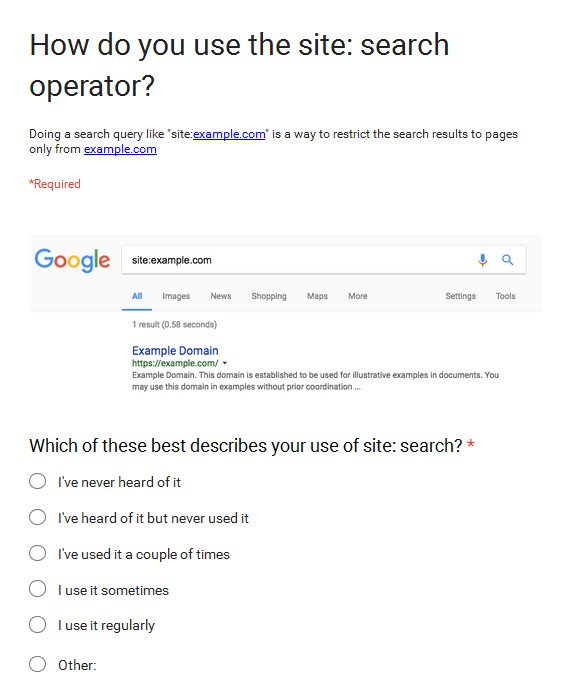2020. 1. 24. 13:40ㆍ카테고리 없음

You can filter explicit search results on Google, like pornography, with the SafeSearch setting. SafeSearch isn’t 100% accurate. But it can help you avoid explicit and inappropriate search results on your phone, tablet, or computer. How SafeSearch worksWhen SafeSearch is on, it helps block explicit images, videos, and websites from Google Search results.When SafeSearch is off, we'll provide the most relevant results for your search and may include explicit content when you search for it. Turn SafeSearch on or off. Go to.

I want to implement a Google Custom Search box on that list page, so that a visitor could enter a query and be presented with only the relevant company names. I have created a separate page for the search results, here. The second option is to password protect your Google Form. To do this, you will have to create two pages for your form. The first page will be a login in page where you can enable Data Validation and require an exact match. Stay focused and improve productivity. Easily block any distracting or harmful website. Stop procrastination once and for all!

Under 'SafeSearch filters,' check or uncheck the box next to 'Turn on SafeSearch.' . At the bottom of the page, select Save.Troubleshoot problems with SafeSearch.
Google Restrict To Site Free

Google Restrict To Site Account
We do our best to keep the SafeSearch filter as thorough as possible, but sometimes explicit content, like porn or nudity, makes it through. If you have SafeSearch turned on, but still see inappropriate sites or images, let us know. Report a site. Report an imageIf you’re searching on and see an image you want to report: Computer. On the image results page, click the image you want to report. At the bottom right of your screen, under the related images, click Send feedback.Phone or tablet.
On the image results page, tap the image you want to report. At the bottom right, tap More Send feedback.
Berlin, Germany – February 26: In this photo illustration the app of Google Chrome is displayed on a smartphone on February 26, 2018 in Berlin, Germany. (Photo Illustration by Thomas Trutschel/Photothek via Getty Images)Google is planning to restrict modern ad blocking Chrome extensions to enterprise users only, according to. This is despite a backlash in January proposing changes that will stop certain ad blockers from working efficiently.And the software giant is not backing down: It says the following the change will be Google’s enterprise users.The proposal–dubbed Manifest V3–will see a major transformation to Chrome extensions that includes a revamp of the permissions system. It will mean modern ad blockers such as uBlock Origin—which uses Chrome’s webRequest API to block ads before they’re downloaded–won’t work. This is because Manifest V3 sees Google halt the webRequest API’s ability to block a particular request before it’s loaded.People aren’t impressed.
Many have complained about the move, which effectively takes control away from an incentive to use other services instead.9to5Google highlighted a single sentence buried in the text of Google’s response to the complaints, which clarified the changes: “Chrome is deprecating the blocking capabilities of the webRequest API in Manifest V3, not the entire webRequest API (though blocking will still be available to enterprise deployments).”In other words, paid enterprise-only users will still have the ability to block unwanted content. It probably means enterprise customers can develop in-house Chrome extensions, not for ad blocking use, 9to5Google says.
For everyone else, the changes announced in January will remain the same.It’s annoying, to say the least, but the reason for these changes is obvious: Ads are at the heart of Google’s business model.“We are starting to see Google’s conflict of interest arising,” Sean Wright, an independent security consultant told me. “Google relies on the revenue of advertising, so one can see why they would make such a move.”What to doThere are many without an ad blocker, so it will see some switch to other providers such as Firefox. However,.It’s important to note that the changes won’t stop all ad blockers from working, but exactly who is affected isn’t totally clear. Google sent me a statement by email, which reads: “Chrome supports the use and development of ad blockers.
We’re actively working with the developer community to get feedback and iterate on the design of a privacy-preserving content filtering system that limits the amount of sensitive browser data shared with third parties.”For now, Wright thinks people should: “Brave is built upon Chromium so all existing Chrome plugins and even themes work on it. This is perhaps why it’s seen an increase in user numbers.”Another option is using something like Pi-Hole, says Wright. “This works on the DNS level and has blacklists of adverts as well as malicious URLs.”.
